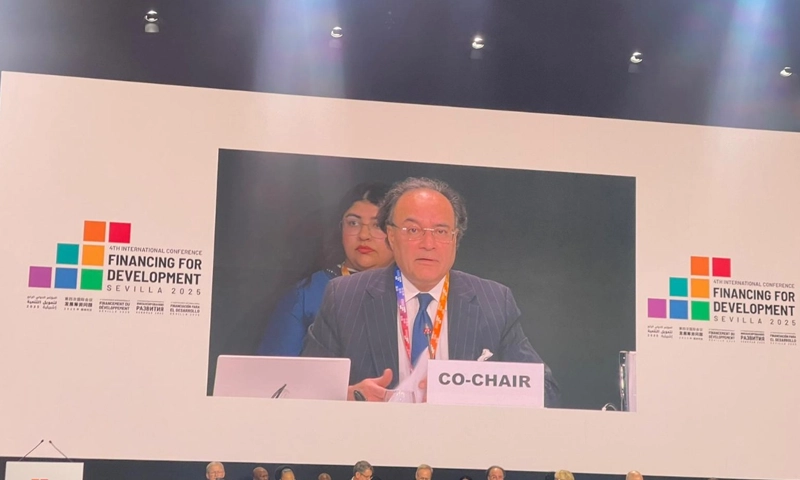- Web
- Feb 05, 2026
Aurangzeb calls for equitable financial reforms, global solidarity at FFD4 in Spain
-

- Web Desk
- Jul 01, 2025

ISLAMABAD: Minister for Finance and Revenue Senator Muhammad Aurangzeb on Tuesday called for sweeping reforms in the global financial architecture, urging stronger multilateral support, innovative financing tools, and greater equity for developing nations during the Fourth International Conference on Financing for Development (FFD4) in Sevilla, Spain.
The finance ministry said in a press release that while addressing the plenary session, Aurangzeb outlined Pakistan’s development challenges and reform roadmap, while backing the Compromiso de Sevilla – a renewed global pledge to bridge the sustainable development financing gap.
He stressed the need to translate past international commitments into practical mechanisms that serve countries most in need.
“The international financial system must be reshaped around fairness, solidarity, and inclusivity,” he said, pointing to debt vulnerabilities, climate crises, and the reversal of development gains as major obstacles for developing economies like Pakistan.
FBR’s revenue collection in FY25 reached Rs865b: Langrial
Welcoming the Compromiso de Sevilla’s proposals, he endorsed efforts to double support for domestic resource mobilisation, expand concessional finance beyond GDP metrics, and re-channel unused Special Drawing Rights (SDRs) into structured development frameworks.
Aurangzeb also called for early action on debt reforms, including the establishment of a UN-led intergovernmental process to fill structural gaps in global debt management and the creation of a borrower-focused platform to amplify the voices of developing countries.
He briefed global delegates on Pakistan’s new five-year National Economic Transformation Plan: Uraan Pakistan, anchored on five pillars – Exports, E-Pakistan, Environment, Energy & Infrastructure, and Equity. Despite multiple external shocks, he said, Pakistan had achieved a primary surplus, lowered its debt-to-GDP ratio, and begun expanding its tax base through digitisation and governance reforms.
Aurangzeb highlighted Islamabad’s strides in green and Islamic finance, financial inclusion through digital infrastructure, and foreign investment facilitation via the Special Investment Facilitation Council (SIFC).
Earlier in the day, Aurangzeb co-chaired a key multi-stakeholder roundtable on “Leveraging Private Business and Finance” alongside Canadian Deputy Minister of International Development Christopher MacLennan. The session explored ways to scale up private finance in sustainable development.
“Public resources alone are not enough – we must unlock private capital through regulatory clarity, credit guarantees, and outcome-linked bonds,” Aurangzeb stated. He called for embedding blended finance models and climate-linked instruments into national SDG frameworks.
He also stressed the need to reform global credit rating systems to better reflect climate vulnerability and development context, urging multilateral banks to scale up technical support and de-risk private sector engagement in climate, housing, and SME finance.
Concluding his interventions, Aurangzeb reaffirmed Pakistan’s commitment to the Compromiso de Sevilla and to building a fairer, more responsive international financial system that leaves no country behind in the journey toward shared prosperity.




